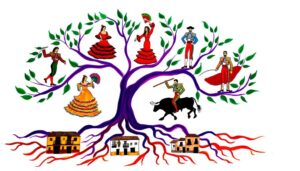Meaning of the Name Aldo
The name Aldo finds its origins in the Old High German word 'ald,' meaning 'old' or 'wise.' Historically, it has been associated with nobility and valor, particularly in medieval Europe. This name embodies qualities of wisdom and respect, esteemed in historical naming conventions.
Figures like Aldo Manuzio and Aldo Moro have enhanced its legacy. Geographically, Aldo retains strong roots in Italy and has spread to regions such as Latin America through cultural exchange.
In modern times, it maintains cultural resonance and simplicity in pronunciation. Exploring further will uncover more about its historical depth and cultural adaptations.

Key Takeaways
- Aldo originates from the Old High German word 'ald,' meaning 'old' or 'wise.'
- It symbolizes wisdom and experience, esteemed qualities in historical societies.
- The name has significant historical importance, often linked to European nobility.
- Aldo is popular in Italy and has spread to other regions through cultural exchanges.
- Variations like Aldous in English and Aldito in Spanish reflect its adaptability.
Etymology of Aldo
The name Aldo finds its origins in the Old High German word 'ald,' meaning 'old' or 'wise.' This etymology reflects a deep-rooted connection to attributes of age and wisdom, suggesting a respect for experience and sagacity.
Linguistically, 'ald' evolved in various Germanic languages, influencing names and terms related to elder statesmen and wise figures in historical societies. The shift of 'ald' into 'Aldo' likely occurred through linguistic changes and cultural exchanges during the Middle Ages.
It is important to note that names bearing such meanings often carried significant weight in naming conventions of the time, embodying virtues esteemed by the community. Therefore, Aldo encapsulates a blend of venerable traits, linguistically preserved through centuries.
Historical Significance
The name Aldo holds substantial historical significance, particularly within medieval European usage, where it denoted nobility and valor.
Several prominent historical figures, such as Aldo Manuzio, have borne this name, contributing to its legacy.
Additionally, the etymological evolution of Aldo reflects broader linguistic trends and cultural exchanges throughout European history.
Medieval European Usage
During the medieval period, the name Aldo emerged as a significant identifier among the European nobility, reflecting both cultural and linguistic influences of the time. Rooted in the Germanic word "ald," meaning old or wise, the name symbolized wisdom and experience, qualities highly esteemed in feudal societies. The prevalence of Aldo among noble families illustrated its status as a marker of distinction and respect.
| Region | Period | Usage Context |
|---|---|---|
| Italy | 10th – 15th century | Nobility and Clergy |
| Germany | 9th – 14th century | Aristocratic Circles |
| France | 11th – 13th century | Royal Courts and Administrative Roles |
| Spain | 12th – 15th century | Noble Lineages |
| England | 11th – 14th century | Landed Gentry and Knightly Orders |
The table above highlights the geographical and temporal distribution of the name Aldo.
Famous Historical Figures
Among the many bearers of the name Aldo, a few remarkable historical figures stand out, leaving indelible marks on their respective eras through their contributions to politics, culture, and society.
Aldo Moro, an influential Italian statesman, played a pivotal role in post-WWII Italian politics, notably during his tenure as Prime Minister. His tragic assassination in 1978 profoundly impacted Italy's political landscape.
Another prominent figure, Aldo Leopold, made significant strides in environmental conservation with his seminal work, 'A Sand County Almanac,' which remains influential in ecological thought.
These individuals exemplify the diverse arenas in which the name Aldo has resonated, showcasing its bearers' profound impact on shaping societal developments through their visionary pursuits and intellectual legacies.
Etymological Evolution
Tracing its origins to ancient Germanic roots, the name Aldo has undergone significant linguistic transformations and cultural adaptations over centuries. Initially derived from the Old High German word 'ald,' meaning 'old' or 'wise,' the name evolved in various cultures, absorbing diverse meanings and nuances.
The etymological journey of Aldo reflects broader historical and linguistic shifts, illustrating how names adapt across time and geography.
- Old High German origins: Derived from 'ald,' meaning 'old' or 'wise.'
- Medieval usage: Adopted by various European cultures, each adding distinct phonetic variations.
- Renaissance period: Gained popularity in Italy, symbolizing wisdom and nobility.
- Modern adaptations: Widespread in contemporary naming conventions, maintaining its essence while embracing modernity.
This rich history highlights Aldo's enduring cultural resonance.
Geographic Popularity
The name Aldo exhibits distinct geographic popularity, reflecting cultural and historical influences across various regions.
In Europe, particularly Italy, Aldo maintains strong traditional roots, while in North America, it has seen fluctuating trends due to immigration and cultural exchange.
Meanwhile, Aldo's presence in Latin America highlights its integration into diverse linguistic landscapes.
Popularity in Europe
While the name Aldo has Italian origins, its popularity has spread across various European countries, each embracing it with distinct cultural significance.
In Italy, Aldo is traditionally associated with nobility and wisdom, reflecting its Germanic roots meaning 'old' or 'wise.'
In Spain, the name has been adopted with a more modern flair, often linked to artistic and intellectual circles.
France sees Aldo as a name that exudes charm and sophistication, resonating with the country's appreciation for elegant simplicity.
Meanwhile, in Germany, Aldo maintains a strong connection to its ancient roots, symbolizing heritage and valor.
Italy: Signifies nobility and wisdom
Spain: Modern, artistic connections
France: Charm and sophistication
Germany: Heritage and valor
North American Trends
In North America, the name Aldo has experienced fluctuating popularity, influenced by immigration patterns and cultural trends.
Historically, Aldo saw significant use among Italian immigrants in the early 20th century, reflecting its Italian origins. Linguistically, the name Aldo, derived from the Old Germanic element 'ald,' meaning 'old' or 'wise,' resonated with communities valuing heritage and tradition.
Over time, the name's prevalence waned, only to see a resurgence linked to the cultural renaissance in the late 20th century, which celebrated ethnic diversity.
More recently, Aldo's popularity has been bolstered by notable figures in fashion and entertainment, contributing to its modern appeal.
Consequently, the name Aldo encapsulates a rich tapestry of historical significance and contemporary relevance in North American society.
Aldo in Latin America
Similarly, the name Aldo has also found a unique cultural resonance in Latin America, where it reflects a blend of indigenous and European influences. The name's Italian origins have been harmoniously integrated into various Latin American societies, where it is seen as both modern and traditional. This synthesis is a reflection of the region's rich history of cultural amalgamation.
- Historical Context: The name's introduction during periods of European colonization.
- Linguistic Adaptation: The ease with which the name Aldo is pronounced in Spanish and Portuguese.
- Cultural Significance: How Aldo is often associated with leadership and nobility.
- Geographic Popularity: Notable prevalence in countries like Argentina, Brazil, and Mexico.
This analysis underscores Aldo's enduring appeal and multifaceted significance in Latin America.
Cultural Associations
Frequently, the name Aldo is associated with Italian and Spanish cultures, where it carries historical and linguistic significance.
In Italy, Aldo is often linked to the Lombardic period, reflecting the Germanic roots of the name, which means 'old' or 'wise.' This connection underscores the name's connotation of age and wisdom.
In Spanish-speaking regions, although less common, Aldo retains similar undertones, signifying respect and reverence for ancestral knowledge.
Linguistically, the name's etymology can be traced to the Old High German word 'ald,' further cementing its historical context.
Cultural associations with Aldo in these regions highlight a blend of tradition and respect for heritage, making it a name that resonates with historical depth and linguistic richness.
Famous People Named Aldo
Several notable individuals named Aldo have made significant contributions across various fields, reflecting the name’s widespread cultural impact. The name Aldo, of Germanic origin meaning ‘old’ or ‘wise,’ has been borne by prominent figures in history and contemporary society. These individuals have left indelible marks in their respective domains, showcasing the versatility and enduring appeal of the name. Similarly, the name Nadia has also left a lasting impression across different cultures and professions. Of Slavic origin, the name Nadia means ‘hope’ or ‘filled with hope. ‘ Throughout history, notable individuals named Nadia have made significant contributions in various fields, demonstrating the enduring impact of the name. The origin and meaning of the name Nadia reflect the qualities of hope and positivity that many individuals with this name embody.
- Aldo Leopold: A pioneering American ecologist, forester, and author, known for his influential book 'A Sand County Almanac.'
- Aldo Rossi: An acclaimed Italian architect and designer, recognized for his innovative theories in architecture and urban planning.
- Aldo Ciccolini: A distinguished Italian-French pianist celebrated for his interpretations of classical and contemporary piano music.
- Aldo Moro: An Italian statesman and former Prime Minister, remembered for his significant political influence and tragic assassination.
Aldo in Literature and Media
The name Aldo has been prominently featured in literature and media, often embodying characters who reflect the name's connotations of wisdom and experience. Historically, Aldo has appeared in various cultural contexts, from novels to films, where it symbolizes sagacity and resilience. For instance, Aldo Raine, a character in Quentin Tarantino's "Inglourious Basterds," portrays leadership and strategic acumen. Linguistically, the name's Italian and Germanic roots lend it a timeless quality, enhancing its narrative appeal.
| Character | Work | Attributes |
|---|---|---|
| Aldo Raine | Inglourious Basterds | Leadership, Strategy |
| Aldo Moro | Historical Representation | Wisdom, Political Savvy |
| Aldo Leopold | A Sand County Almanac | Environmental Wisdom |
| Aldo Gucci | House of Gucci | Business Acumen |
| Aldo Kelrast | Mary Worth (Comic Strip) | Complexity, Mystery |
This recurring use underscores Aldo's enduring relevance and versatility in storytelling.
Modern Usage Trends
Building on its rich literary and media legacy, Aldo continues to enjoy modern usage trends that reflect its historical significance and timeless appeal. The name Aldo, with its roots in Old Germanic meaning 'old' or 'wise,' remains relevant in contemporary naming practices. Its phonetic simplicity and cultural versatility contribute to its enduring popularity.
- Popularity in Italy and Latin America: Aldo is frequently chosen, reflecting its deep cultural resonance.
- Celebrity Influence: Various public figures named Aldo contribute to its sustained visibility.
- Globalization: The name's adoption across different cultures demonstrates its universal appeal.
- Modern Media Representation: Aldo appears in recent films and television series, reinforcing its presence in popular culture.
This multifaceted usage underscores Aldo's broad linguistic and cultural adaptability.
Variations and Nicknames
Aldo, with its rich etymological roots, has spawned a variety of forms and affectionate nicknames across different cultures and languages. Historically derived from the Old Germanic element 'ald,' meaning 'old' or 'wise,' the name has evolved in form and usage.
In Italian-speaking regions, diminutives like Aldino or Alduccio reflect endearment. In Spanish-speaking contexts, the name sometimes morphs into Aldito or Aldín, maintaining its affectionate tone. Linguistic adaptations have also led to variations such as Aldous in English.
Each derivative preserves the core attributes associated with the original name, underscoring its historical significance. These variations and nicknames illustrate the name's adaptability while retaining its timeless, venerable essence.
Conclusion
The name Aldo, with its rich etymological roots and historical significance, resonates through time and geography, embodying cultural and literary grandeur.
Its popularity spans continents, gracing notable figures and media representations alike. Modern trends reflect a resurgence in its usage, echoing the timeless appeal of this venerable name.
Aldo stands as a beacon of linguistic heritage, its variations and affectionate nicknames only adding to its unparalleled charm.
The name Aldo is nothing short of an eternal symphony in the lexicon of human nomenclature.






